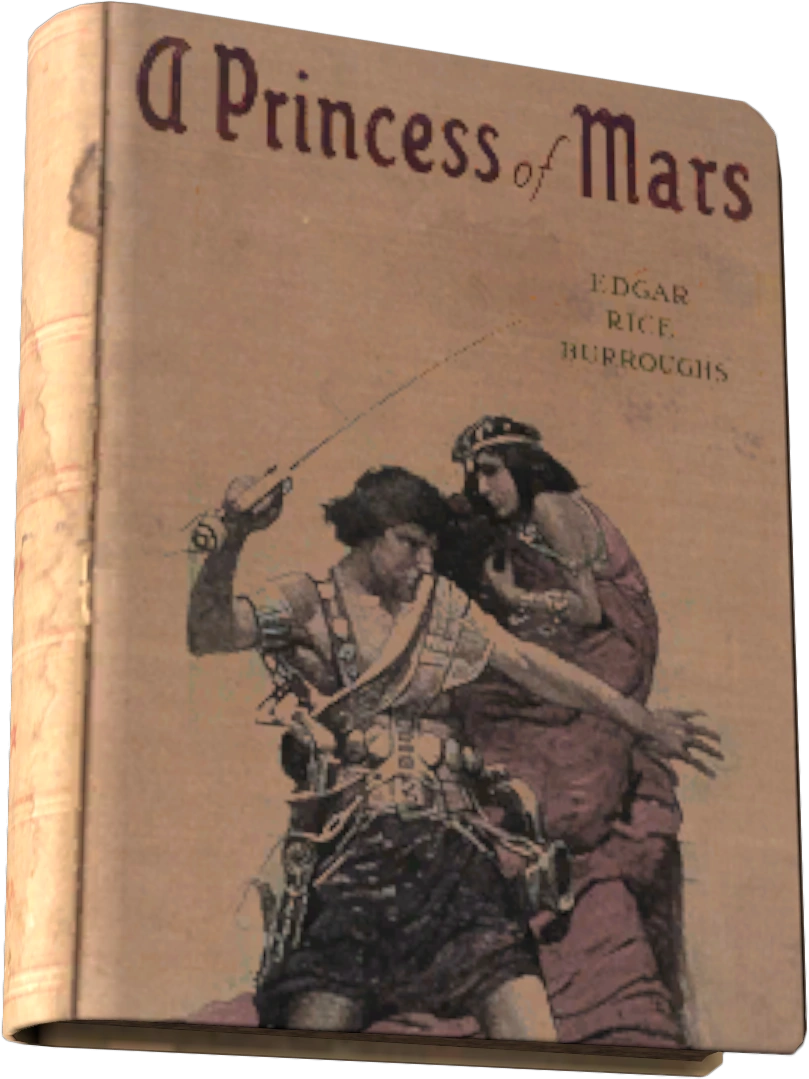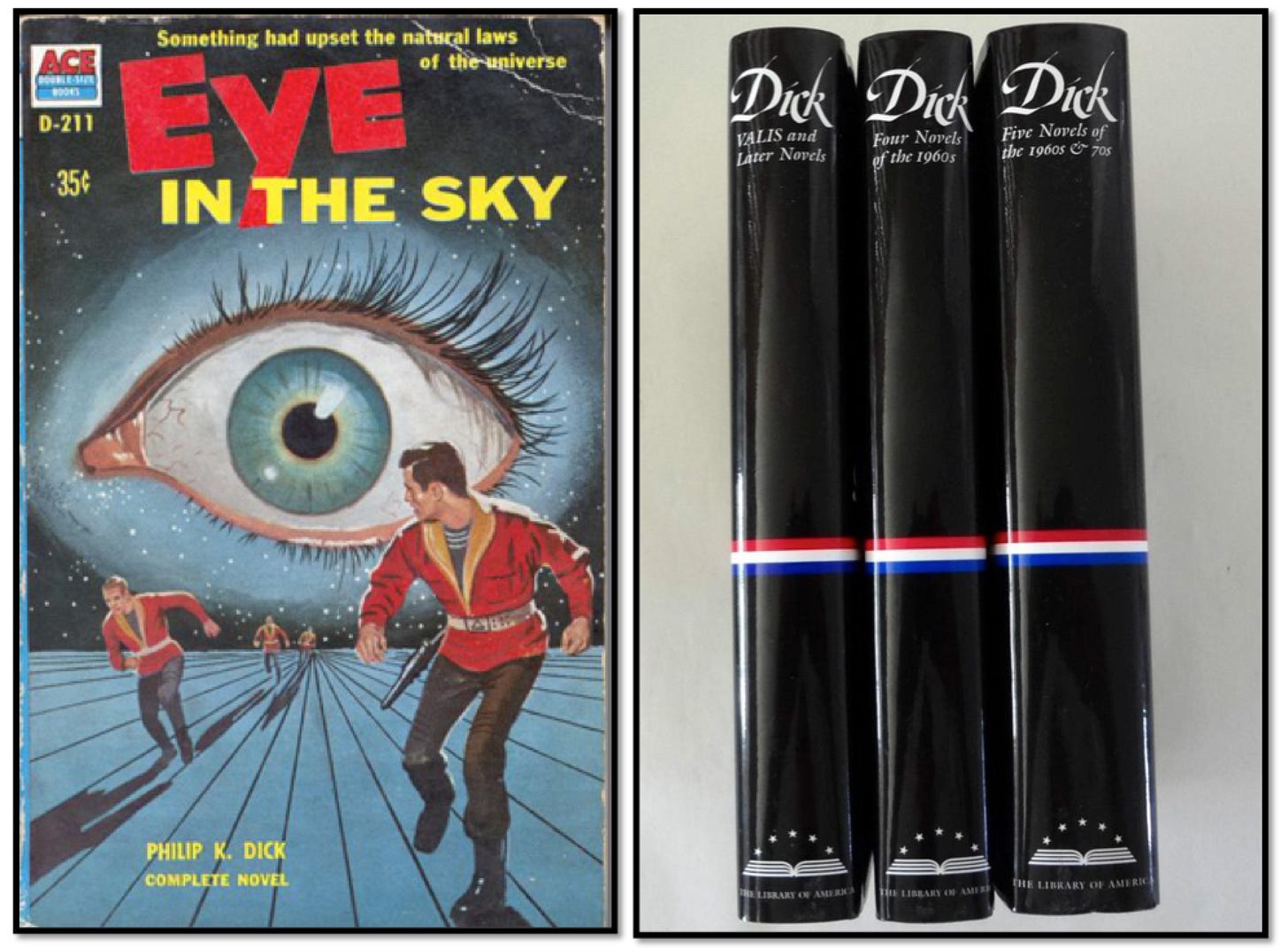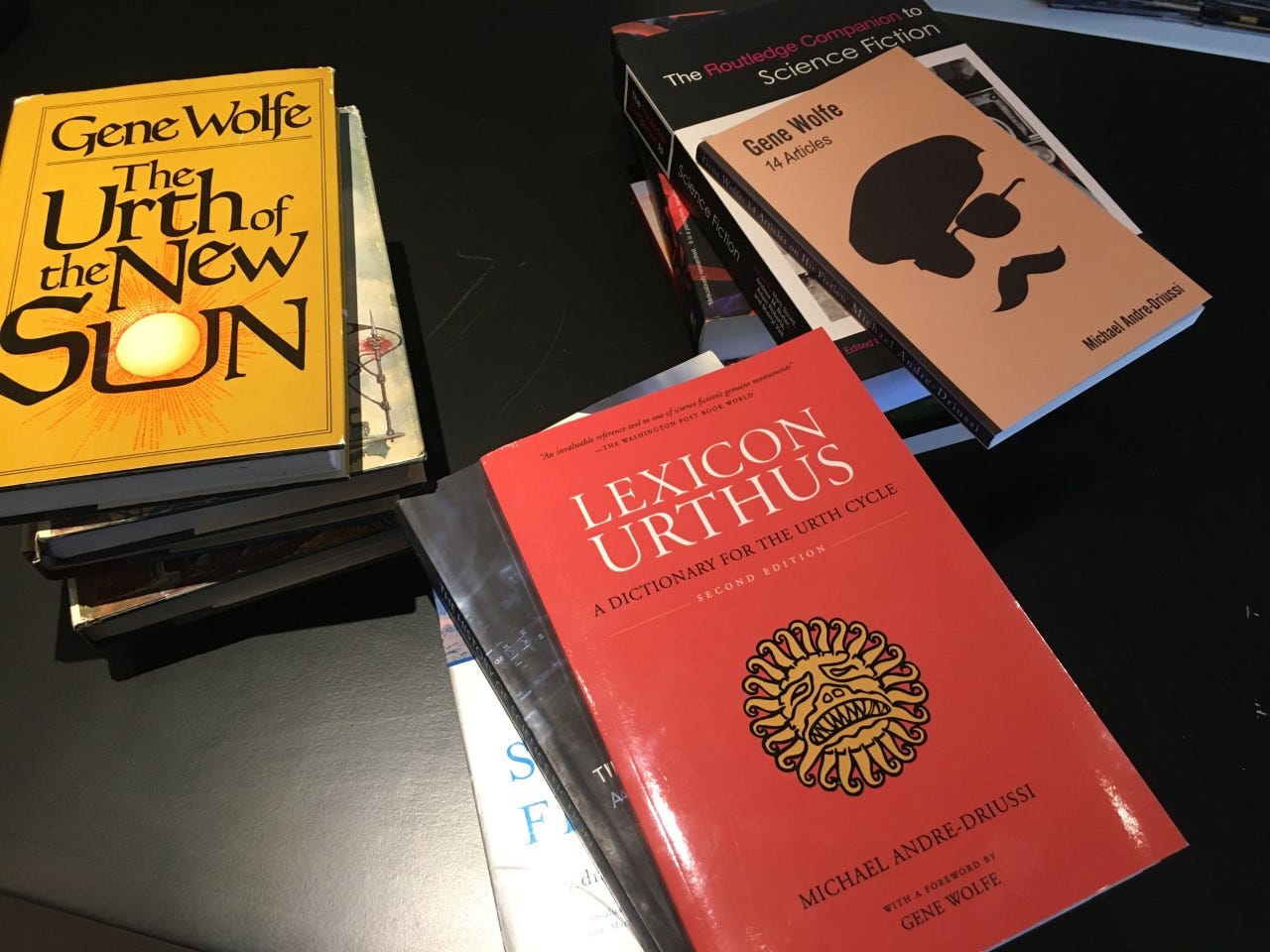Science Fiction Was My Mid-Life Crisis
Other guys get a hot car or a facelift or even a new spouse, but I returned to the most outlandish books from my youth
I always knew that guys did strange things in their 40s. In fact, I’d seen it—but only from afar, like those accidents you view through the window of your passing car, thinking I wonder if that could happen to me?
Better drive more carefully. Don’t wanna end up like that.
But, like I say, this was all something I saw at a safe distance. I didn’t actually have middle-aged friends until the syndrome crept up on all of us at once. It wasn’t that I made new friends of more advanced years—it was just my young friends weren’t young any longer.
And some started doing peculiar things. Not just buying a hot new car, but the stranger phenomenon of purchasing the exact model of car that was hot decades ago when we were all teenagers—restored, repainted, and rejuvenated in a way we never could be ourselves.
The Honest Broker is a reader-supported newsletter. Both free and paid subscriptions are available. Those who want to support my work are encouraged to take out a paid subscription.
I felt like saying: What you’re really looking for is a time machine, my friend. And you’re not gonna find one of those on Craigslist. Better to stick with the Ford Explorer.
Then the affliction hit me. And in the most unexpected way possible.
I didn’t buy a hot new car. That was out of my budget. I didn’t find a hot new wife—that was out of my league ( and I was very happy with my current family setup, thank you very much)—or have an affair with my administrative assistant. I’d have to hire an administrative assistant first, and that’s out of my budget too. I didn’t get a face lift or dye my hair or have my navel pierced. I didn’t experience a dark night of the soul, or even an overcast afternoon of the soul, for that matter.
But I did try to recapture the lost days of my youth, although in a way I’d never anticipated.
I started reading science fiction books. And lots of them.
This made no sense. The last time I had taken a serious interest in science fiction was in 8th grade. The typical mid-life crisis is an attempt to recapture the magic of your late teens and twenties. And here I was revisiting a passion that had disappeared at age twelve. (Full disclosure: I also collected Matchbox cars, View-Master disks, and bubble gum cards back then—so I’m fortunate none of those passions recurred nel mezzo del cammin di nostra vita.)
Back then I cherished a collection of science fiction magazines inherited from my brother Dana, seven years older than me, who had just gone off to college. It consisted of dozens of copies of Amazing Stories, Fantastic, Galaxy, Analog, and other pulp fiction periodicals with their gaudy and tawdry covers. And Dana also gave me a copy of Edgar Rice Burroughs’ A Princess of Mars in a powerful gesture of proselytization—take this brother, may it serve you well—a book that thrilled my adolescent soul to its shallow marrow.
During the brief halcyon spell of late adolescence, I tasted the marvels of stories by Isaac Asimov, Ray Bradbury, Arthur C. Clarke, Fritz Leiber, and other masters of the idiom. But I also developed passions for sci-fi books and authors now completely forgotten.
I don’t think I’ve encountered the name Eando Binder even once in the last thirty years, but I devoured his stories about the robot Adam Link with the enthusiasm of Joey Chestnut at a hot dog stand. And I’m not sure what the current day royalty checks enjoyed by the estates of Jack Sharkey (1931-1992), Murray Leinster (1896-1975), or L. Sprague de Camp (1907-2000) might amount to, but these were luminous sages for me, in those innocent days, visionaries who could see a future the rest of us could only view secondhand via the cheaply-printed pages of their pulp fiction tales.
Then this phase passed. It happened the summer before I went to high school. Someone gave me a list of literary fiction titles suitable for high school students. There were around 40 or 50 books on the list—by John Steinbeck, Harper Lee, F. Scott Fitzgerald, Edith Wharton, J.D. Salinger, William Golding, Jane Austen, etc. I recall that the list did include science fiction books by at least four writers—Aldous Huxley, George Orwell, Ray Bradbury and Kurt Vonnegut—but the implicit message was clear: you approached these works as literary novels, not escapist science fiction stories. I didn’t manage to read all of the titles on the list, but I made a serious dent in it before I embarked on my first day of high school.
And I never read another science fiction novel until my 40s. It didn’t feel like a sacrifice. It felt like growing up. When I became a man, I gave up childish ways, Paul of Tarsus tells us. And that’s exactly how I viewed those sci-fi stories that had thrilled me as a youngster.
I have done away with childish things.
Fast forward thirty years later. Something stirred in me when I saw a review of a book by Philip K. Dick in a serious literary journal. I vaguely recalled Dick from a youthful encounter with his work decades before in Amazing Stories. But nothing could be more amazing than to see his name in TLS or New York Review of Books. That seemed like an alternative reality experience even beyond those Dick described with such fervor in his stories.
Around that time, I had been reading Miguel de Unamuno and Robert Musil, but on a lark, I decided to put those authors aside and check out Philip K. Dick instead. I purchased The Man in the High Castle, wondering whether it could stand comparison with the literary masters that had formed my middle-aged tastes in fiction. After years of imbibing stream-of-consciousness, postmodernism, the Nouveau Roman, and every other trendy fiction style, could I really return to a genre that had seemed too childish to me even back in in ninth grade?
As I read The Man in the High Castle, I found the prose clumsy, the characters flat and insipid, the descriptions of scenes slapdash and unconvincing. This was not great writing, by any measure. Some of it was laughably bad.
And yet. . .
And yet, there was something passionate and wild and prophetic about the book that couldn’t be denied. It was only a few years later that I began to understand how well Dick predicted so many aspects of life in the digital age. But even at that first moment of impact, I sensed that this novelist had something to say that deserved to be heard. Like so many innovators in American arts—Poe, Whitman, Ives, Zappa—his very zaniness and indelicacy was part of the appeal.
After The Man in the High Castle, I moved on to another Dick title. The next one was Valis, and this book really shook me up. Perhaps Dick was crazy—well, almost certainly he was crazy, as he himself admitted—but Valis was a genuine work of avant-garde fiction, with unreliable narrators, disjointed prose, self-cancelling narratives, metafiction postures, and a host of other devices I’d never expected to encounter in a pulp fiction story. A work like Valis shouldn’t even be possible according to my snobbish literary presumptions, and here it was in my hands, violating every stereotype about sci-fi books.
And that was when science fiction became my mid-life crisis. I was hooked. In the coming months I read theses works:
Philip K. Dick—Flow My Tears, the Policeman Said
Ursula K. Le Guin—The Dispossessed
Alfred Bester—The Demolished Man
Frank Herbert—Dune
Larry Niven—Ringworld
Robert Heinlein—Stranger in a Strange Land
Philip K. Dick—Ubik
Ursula K. Le Guin—The Left Hand of Darkness
Robert Heinlein—The Moon is a Harsh Mistress
Robert Zelazny—Lord of Light
A.E. Van Vogt—The World of Null-A
Stanislaw Lem—Solaris
Frederik Pohl—Gateway
Octavia Butler—Fledgling
Iain M. Banks—The State of the Art
William Gibson—Neuromancer
Robert Silverberg—Nightwings
Joanna Russ—The Female Man
Gene Wolfe—The Book of the New Sun
Brian Aldiss—Report on Probability A
Clifford Simak—City
Samuel R. Delany—Dhalgren
Walter M. Miller—A Canticle for Leibowitz
…and many, many others.
Some of these books were second-rate, or targeted at callow youths (I know the type; I was one myself)—perhaps churned out by a writer struggling to pay the rent, with little concern over niceties of style and thematic development. But a surprising number of these books were first-rate—some even worthy of comparison to the literary masterworks of the era.
I had known about Dune since my childhood, and had actually started reading it at age eleven or twelve—before giving up in the face of its length and arcane terminology (requiring a glossary in the back of the book). But now in my mid-40s, I returned to Dune, and this time it struck me as extraordinarily rich, inventive, and imaginative in its construction. Here, in a work of epic scope, I encountered an overabundance of themes, from the ecological to the theurgic, that had become more timely, if anything, during the intervening years. The same was true of Ursula K. Le Guin’s The Left Hand of Darkness, Gene Wolfe’s The Book of the New Sun, and Robert Heinlein’s The Moon is a Harsh Mistress. By any measure, these were expansive, multilayered works.
Reading Gene Wolfe was probably the most unsettling experience of them all. By all reasonable assumptions, The Book of the New Sun (a series of four novels published between 1980 and 1983) is a literary work that shouldn’t exist—at least according to conventional genre definitions. The plot seems, at first or even second glance, little more than a conventional swords-and-sorcery potboiler, but at every turn the reader encounters apparent (and often quite ambiguous) hidden meanings, arcane symbols, unexplained gaps in the narrative, and possible allegorical substructures that no adolescent or teenage reader could be expected to grasp. In fact, this is one of the most complicated novels I’ve encountered—and I’ve read pretty much all of the most difficult ones, from The Recognitions to Finnegans Wake—requiring much patience and the most careful rereading. Yet it was packaged and sold as a sci-fi adventure story for the mass market. What’s going on here?
As I dug more deeply into the genre, I began to develop a passionate affection for writers who, just a few years before, I’d never heard of—David R. Bunch, James Tiptree, Jr. (a pseudonym for Alice Bradley Sheldon), R.A. Lafferty, Cordwainer Smith, and other figures who were betwixt and between. They had never earned the attention of the literary world, but were almost certainly too ambitious to appeal to the juvenile audience that has always constituted the target audience for the genre.
Of course, it helped that so many legitimate writers were now embracing sci-fi concepts. I thought I was the only person of advanced years paying attention to these books, but then Cormac McCarthy—as elite a figure in American letters as you can find—released a dystopian science fiction book called The Road. And it won the Pulitzer Prize in fiction. Yet it was closer in spirit to Richard Matheson’s pulp fiction thriller I Am Legend than any previous winner of that coveted award. Haruki Murakami, perennial candidate for the Nobel Prize, delivered an immense book called 1Q84 that pursued a plot line very similar to those Philip K. Dick had contrived decades before. Kazuo Ishiguro actually won the Nobel after publishing Never Let Me Go, which is pure sci-fi of the highest quality. And now that I was sensitive to these currents, I began to perceive that other books that I had previously considered as highbrow fiction—such as Infinite Jest or The Blind Assassin, Wittgentsein’s Mistress, or Blindness, even Gulliver’s Travels and Gargantua and Pantagruel—relied heavily on sci-fi premises.
If a taste for science fiction represented a mid-life crisis, I was clearly not alone. The whole establishment of literati was moving in lockstep, it seemed, heading in the same direction I had taken. It was now the old-school advocates of realist fiction who seemed the outliers.
And that was how I recovered from my mid-life crisis. I never really got over my affliction. But everyone else came down with the same malady. I see a passion for sci-fi plots everywhere in the current day. TV shows with science fiction premises were once rarities, a kind of Star Trek eccentricity. But now futuristic premises are mainstays of networks and streaming platforms. Science fiction movies are not only more popular than ever today, but can even get nominated for Best Picture (Gravity, The Martian, Mad Max: Fury Road, The Shape of Water, etc.).
Alas, it’s no fun when your rebellious mid-life reinvention of yourself turns out this way. I thought I was doing something different from the rest, and now I find I was just part of a larger demographic trend. Maybe I should have saved up for that hot car instead. No, not a new one, but maybe a restored Mustang—like the ones that were popular back in my youth. That just might be the ticket. Not a time machine, but maybe the next best thing.






Good for you. I fully agree about The Book of the New Sun, a towering work of art. I was reading SF by age 10, but I never stopped because I kept reading better and better writers. From writers you cite, I'd come to love Cordwainer Smith, Lafferty and even David R. Bunch (courtesy of a recommendation by Harlan Ellison in Dangerous Visions) while still a teenager. I read Lord of Light, The Female Man, Report on Probability A & Dhalgren as soon as they were first published, and they remain favorite books. But I had also read earlier books by all 4 of those writers, so reading them was a natural progression. I read Dune serialized in Analog before the book publication, but I've always felt that it was overrated. After Judith Merril published England Swings SF, I turned my eyes across the Atlantic and, with a few US exceptions like Connie Willis & Ann Leckie, have read mostly better UK writers such as Iain Banks (both with and without the M), M. John Harrison & Gwyneth Jones ever since. Brian Aldiss & J.G. Ballard had been favorites since the very early '60s, though, and I never abandoned them, even when they wrote ostensibly non-genre fiction. I started reading Michael Moorcock with Elric sword and sorcery potboilers, albeit with unusual philosophical subtexts. But Moorcock, who is insanely prolific, also wrote literary borderline SF such as Mother London and the magnificent 4 volume A History of Europe Between the Wars (aka the Pyat Quartet) which rivals The Book of the New Sun as a literary achievement, as long as you can stomach its horrific 1st person narrator - more unreliable than Severian, and a much darker and deliberately more hateful a figure. According to the author, the point of that exercise was trying to understand how a civilized Europe could have let the Holocaust happen. Reading Moorcock & Ballard and other more literary SF writers led me effortlessly into Pynchon, DeLillo, Barth, John Hawkes, Bill Burroughs, Umberto Eco and others. I don't see much distinction between them and the SF writers who I like. I like McCarthy, but wasn't that impressed by The Road. I think his best is Blood Meridian, or An Evening's Redness in the West.
I'm hooked too.